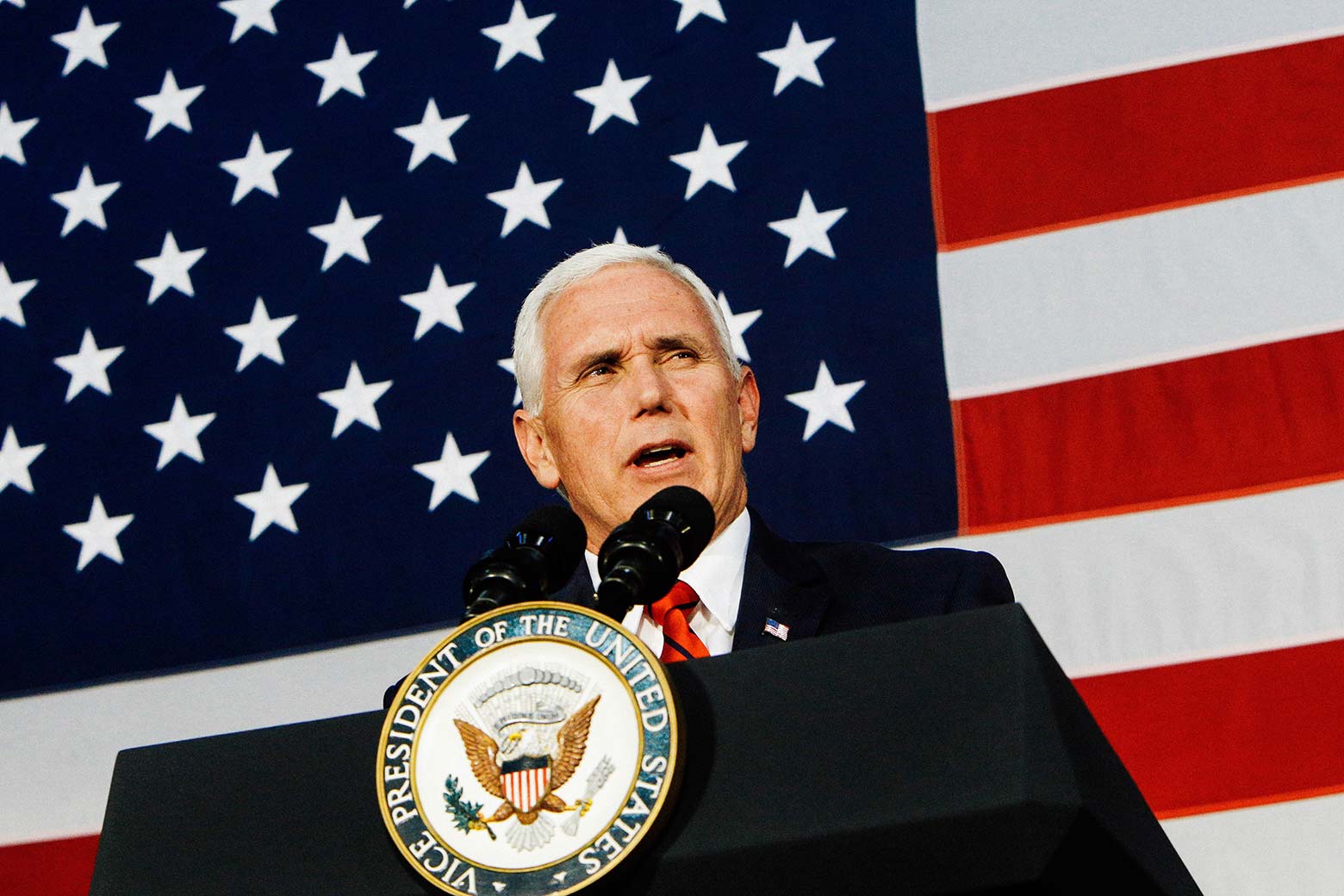Vice President Mike Pence spoke to thousands of Southern Baptists on Wednesday morning at the annual meeting of the Southern Baptist Convention. His appearance had been announced just a few days earlier and was met with unusual resistance by the overwhelmingly conservative audience of pastors and other church leaders.
Republican presidents and administration officials have been appearing at SBC meetings since Gerald Ford spoke to the convention in 1976. That was shortly before the denomination’s turn toward uniform conservatism, and GOP officials and presidents have spoken to SBC audiences frequently over the years. But the announcement earlier this week about Pence’s appearance at the Dallas meeting provoked a remarkable pushback from attendees. Five pastors made formal attempts to pass motions to prevent the vice president from speaking or to bar politicians from speaking at future meetings. A Virginia pastor offered a proposal to replace Pence’s appearance with a session of prayer, because the appearance would hurt “our minority brothers and sisters” and confuse the denomination’s Christian message.* The measure did not go up for an official vote, but observers in the hall estimated that at least 30 percent of attendees supported it. Another pastor proposed that Pence’s speaking slot be taken by H.B. Charles Jr., a black pastor in Florida.
Trump’s election has exposed serious divisions in the country’s largest Protestant denomination. The denomination’s influential policy head, Russell Moore, has been an outspoken critic of the president. Beth Moore, a hugely popular Southern Baptist author and Bible teacher, has also spoken consistently against the president’s approach to women. But the denomination’s old guard, who tend to be more loyally Republican, have largely embraced Trump. Moore’s predecessor, Richard Land, joined Trump’s evangelical advisory council. One of the president’s most vocal Christian supporters, Robert Jeffress, is pastor of a large Southern Baptist church.
The vice president’s speech on Wednesday morning was a rather boilerplate recitation of the president’s achievements, starting with this week’s attempts at diplomacy in North Korea. He also listed the opening of the U.S. Embassy in Jerusalem, the passage of the tax bill, and Trump’s nomination of judges including Neil Gorsuch. “It’s been 500 days of action, 500 days of accomplishments,” Pence told the crowd. “It’s been 500 days of promises made and promises kept.”
As Pence often does in evangelical settings, he emphasized Trump’s respect for Christians’ beliefs and his appreciation of their prayers, rather than the president’s personal faith. If you aren’t listening carefully, you could come away from these speeches believing Pence has firmly vouched for the president’s Christian bona fides. In reality, he largely relies on distancing phrases like this one, from Wednesday: “I’ve witnessed the deep respect our president has for this nation of faith.”
More interesting than the speech, however, was the response in the convention hall. True, there were many moments of sustained applause and several standing ovations at red meat like “defund Planned Parenthood.” Early on, someone in the crowd of pastors yelled out “FOUR MORE YEARS!” But panning shots of the thousands of people in the room also captured many people sitting with their arms crossed through many applause lines. North Carolina pastor J.D. Greear, the denomination’s newly elected president, tweeted that the speech sent a “terribly mixed signal.”
There are other signs of change emerging from the annual meeting of thousands of Southern Baptist delegates. On Tuesday, delegates overwhelmingly elected Greear as the their next president. At 45, Greear is the denomination’s youngest president in decades. He is theologically conservative and studied under Paige Patterson, the Southern Baptist conservative icon recently deposed from his seminary position because of his approach to women’s issues. But he does not share all the old guard’s priorities, and he has spoken about the need to increase racial diversity within the denomination. In the wake of Patterson’s disgrace, women’s issues have become a major topic at the meeting on Tuesday and Wednesday. Meanwhile, although Pence barely mentioned immigration in his speech on Wednesday, the delegates on the floor overwhelmingly passed a resolution calling for immigration reform, affirming the dignity of immigrants, and condemning “any form of nativism.”
Resolutions aren’t the same thing as revolution. The denomination remains firmly committed to a “complementarian” approach to gender roles, for example, meaning that it believes women are unfit to lead churches. When I tuned in briefly to a presentation Wednesday morning by a Baptist seminary head, his assertion that “we’re not going to have a female as a preaching professor, that’s just not going to happen” drew sustained applause. But it’s still significant that the SBC is being forced to grapple publicly with sexual abuse, domestic violence, and misogyny. The seminary head only made his comment in the first place because a woman in the audience has asked about how he was working to develop female leadership in his institution.
A breeze within the SBC sometimes foreshadows dramatic gusts throughout conservative evangelicalism. As Washington Post reporter Michelle Boorstein reminded readers on Twitter, the denomination took no official position on abortion in the immediate wake of Roe v. Wade. Then Patterson’s conservative resurgence remade the denomination, and abortion became a litmus test with an enormous impact on elections, policy, and culture. The SBC’s priorities are a good indication of evangelicalism more broadly. Republicans who count on white evangelical votes ought to pay attention to the vice president’s cool reception this week in Dallas.
Correction, June 14, 2018: This post originally misidentified the home state of the pastor who proposed to replace Pence’s appearance at the SBC meeting with a session of prayer. He is from Virginia, not Florida.
